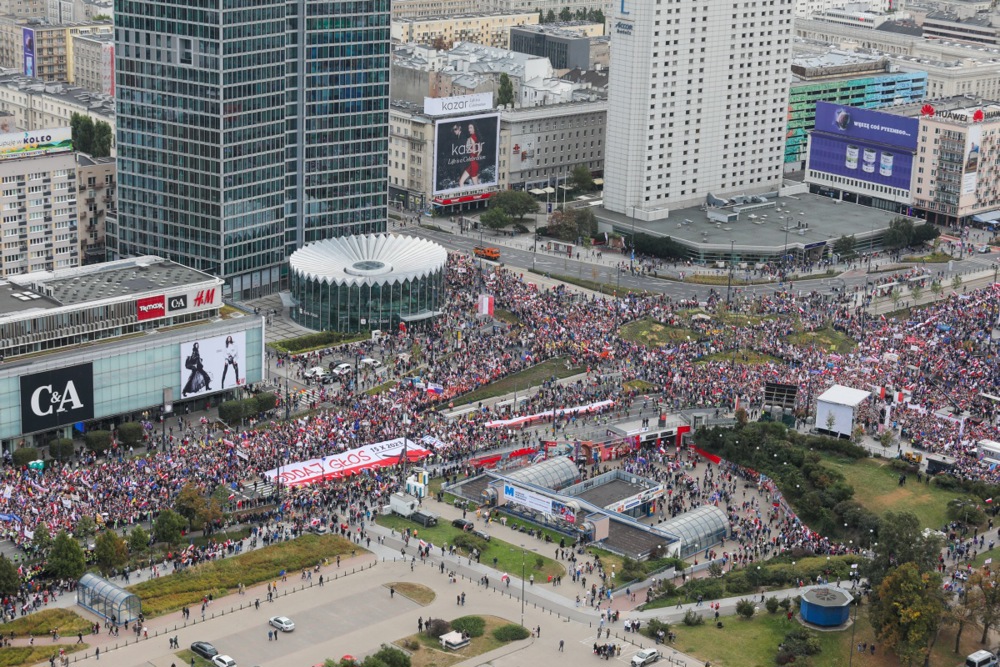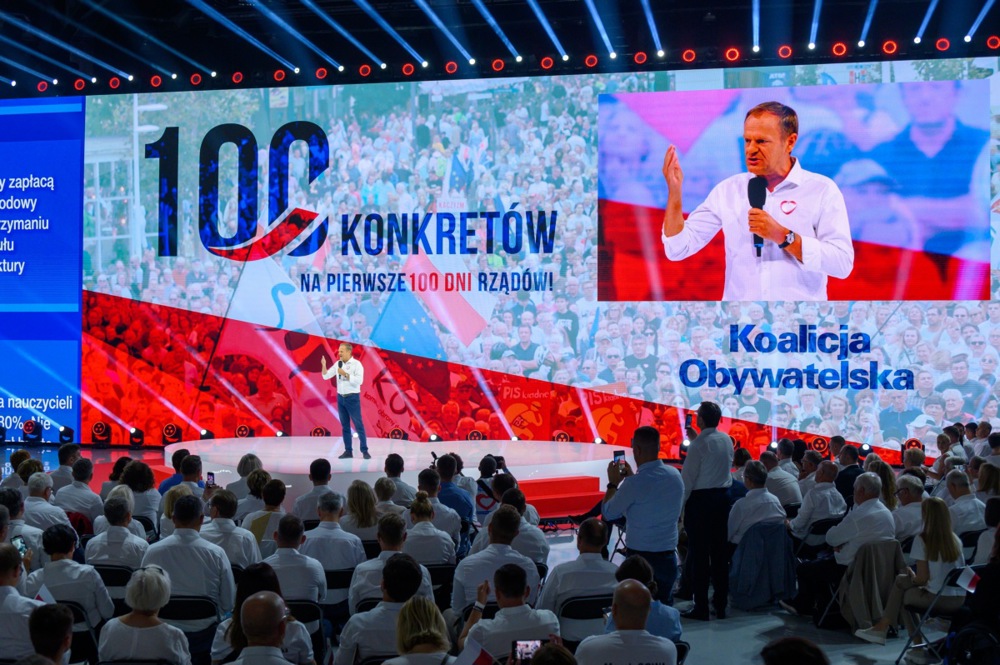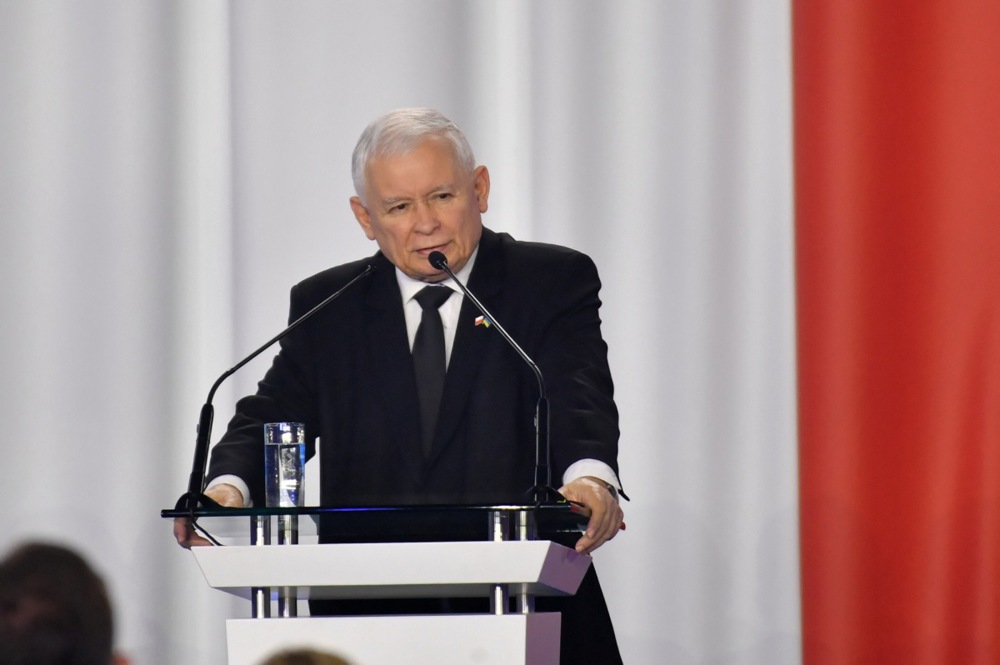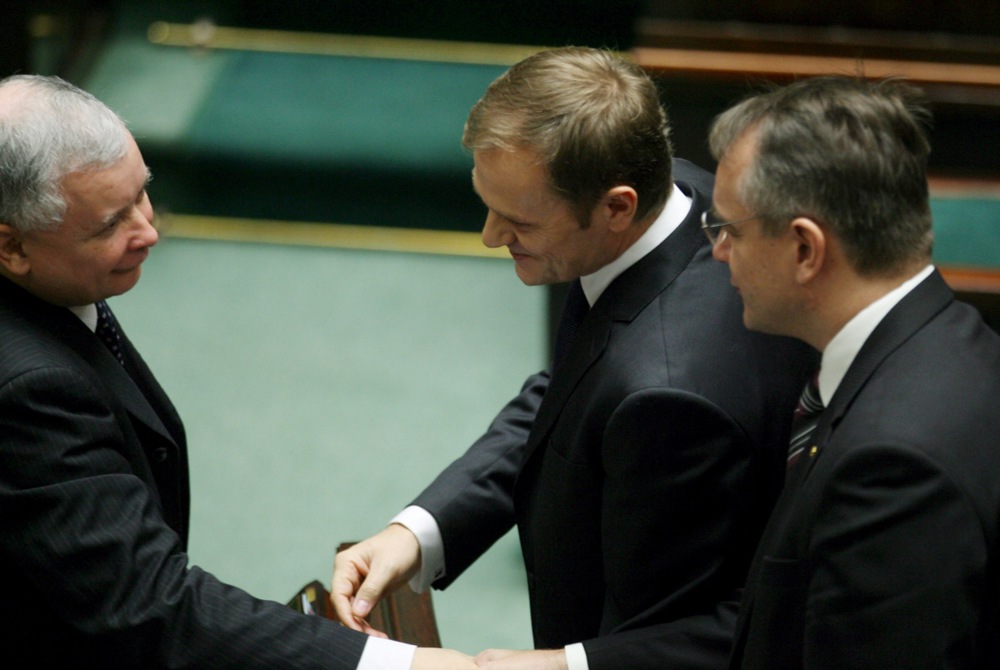The much-anticipated appearance in a debate on Polish public television station TVP by Donald Tusk did not go as he might have wished.
The opposition leader stumbled over the first question and then became embroiled in trading barbs with Prime Minister Mateusz Morawiecki.
The evening TV event, held on October 9, was a formal affair with six questions being asked of all the party representatives present. Each were given one minute to answer each question and an additional minute for closing statements during the 60-minute debate.
The editor of Poland’s leading daily Rzeczpospolita Bogusław Chrabota had, on the morning of October 9, written in an editorial that Tusk’s appearance in the all-party broadcast debate was a win-win situation.
Chrabota pointed out that, despite having been lambasted by TVP for the past eight years, all eyes would be on Tusk and he could disassociate himself from the image painted of him.
In the end, Polish commentators agreed that the debate was not Tusk’s finest hour. From the start he appeared to be on edge. That was illustrated by the fact that he clearly tripped up at the first question, on migration policy, and was caught out by the warning signal 10 seconds before his allotted time was over.
An uncomfortable silence followed as he realised that he still had 10 seconds left to complete his answer. To many, it seemed an extraordinary error for a politician of his experience and standing to make, especially right at the start of a key televised election debate.
By falling at the first, it is unlikely Tusk will be remembered for calling the leader of the ruling Conservatives (PiS) “chicken” for having failed to turn up, with Prime Minister Mateusz Morawiecki attending the debate instead.
Morawiecki did everything he could to make Tusk feel more uncomfortable by targeting the opposition leader in all his own answers to the questions asked.
A rattled Tusk tried to ridicule Morawiecki’s combative approach saying, “What have they put in that glass of water that you’re so aggressive?” as the Prime Minister attacked Tusk’s record when in government from 2007 to 2014.
The opposition leader at one point tried to hit back at Morawiecki for being “out of touch” due to the money he had made in his time as a CEO of a bank.
Morawiecki retorted: “I gave up big money to serve Poland whereas he [Tusk] left Poland for big money in Brussels.” That was in reference to Tusk quitting as prime minister in 2014 to take up the post of President of the European Council.
Tusk fared slightly better when lambasting the absent PiS leader Jarosław Kaczyński. When asked about defence policy, Tusk repeated his charge that Kaczyński was too scared to attend the debate. “Cowards and freaks cannot defend us,” he sniped.
The only reference either Tusk or the Prime Minister made to the other parties present at the debate was when Morawiecki said, “they all support Tusk”. He added that the choice for the voters was one “between a coalition of chaos or effective government that we [PiS] have provided”.
In his closing statement Tusk, visibly irritated at how things had gone, challenged both Morawiecki and Kaczyński to another debate that could be accessed by all Polish media.
“Please come with Jarosław Kaczyński, there can be the two of you, we can hold a debate with all the media, I am open to any suggestions,” he said.
“I will be waiting for you on Friday [October 13] in any location of your choice. You saw what this debate was like. The questions were usually longer than the answers.”
As Tusk and Morawiecki attacked each other’s governmental records it was left to the other four participants in the debate to try to put forward some ideas. They gained some benefit from the fact that, for a change, they were participating on equal terms with the two major players.
The European Union only came up during a question on the Migration Pact. It was evaded by most of the participants who preferred instead to concentrate on the controversies surrounding the issuing of visas to foreign workers.
The six questions asked by the debate panel were on migration, retirement age, welfare benefits, privatisation, defence and unemployment: all areas of policy that are seen as PiS strengths.
The representatives of the smaller parties were: Szymon Hołownia (Third Way alliance), Joanna Schering-Wielgus (Left), Krzysztof Bosak (Confederation) and Krzysztof Maj (Local Government Independents). All employed the tactic of broadening each question to include their own party’s policy proposals in adjacent areas.
For example, Hołownia used the retirement age question to project his block’s ideas on improving the health service, and the welfare benefits one to project the importance of improving public services such as education.
He also answered the question on privatisation by promising that his party would tackle what he called nepotism and cronyism in the public sector.
Bosak, a Confederation party leader, used a similar tactic in getting his messages across. On the issues of the retirement age and welfare benefits, for example, he emphasised that Poland could not afford to give generous social benefits to Ukrainians.
What appeared a more constructive approach to the debate by the representatives of the smaller parties left pundits feeling it was they rather than Tusk and Morawiecki who actually gained anything from the event.
If the voters agree and reward the smaller parties with their support, the expected hung parliament following the October 15 elections could well materialise.





